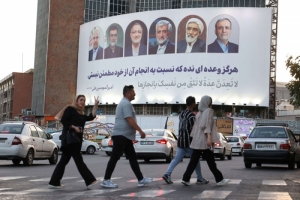Washington is more than present in the Iranian presidential elections
Washington is more than present in the Iranian presidential elections
6-28-2024
 Tehran – Iranian voters head to the polls on Friday with their eyes set on choosing a president who can improve the economic and social situation so that Iran does not find itself under pressure from the United States, which is strongly present in the minds of Iranians and the statements of the candidates to succeed the late President Ebrahim Raisi.
Tehran – Iranian voters head to the polls on Friday with their eyes set on choosing a president who can improve the economic and social situation so that Iran does not find itself under pressure from the United States, which is strongly present in the minds of Iranians and the statements of the candidates to succeed the late President Ebrahim Raisi.
Iran’s parliament speaker and conservative presidential candidate Mohammad Bagher Qalibaf warned that the next president may have to “sell Iran to Trump or create serious tension in the country” if economic problems are not resolved.
In the minds of Iranians, former US President Donald Trump is associated with his decision in 2018 to withdraw from the nuclear agreement unilaterally, which was the reason for the re-imposition of sanctions on Tehran and its exclusion from the global economy, which exacerbated the tensions affecting the Iranian political climate.
Candidate Qalibaf warns that the next president may have to sell Iran to Trump if economic problems are not resolved
Iran has seen mass protests over economic woes and women’s rights abuses. Tensions with the West have also risen with a series of land and sea attacks on shipping, either directly or through its Houthi proxies in Yemen, after the war in Gaza broke out.
What happens in the war and Iran’s future may depend directly on the United States, which the leader of the 1979 revolution, Ayatollah Khomeini, denounced as the “Great Satan” and is still reviled at major events such as a recent speech by the 85-year-old Supreme Leader Ali Khamenei.
Khamenei warned against supporting candidates who “think that all paths to progress go through America,” a veiled criticism of the only reformist running, Masoud Pezeshkian, who hopes to return to the 2015 nuclear deal.
The six presidential contenders (two of whom withdrew on Thursday) chanted Trump’s name. Former hardline candidate Amir Hossein Ghazizadeh Hashemi said that if Trump wins the presidential elections, “we will be able to negotiate with him and impose our demands on him.”
State media reported that Tehran Mayor Alireza Zakani and Amir Hossein Ghazizadeh Hashemi, head of the Martyrs Foundation, withdrew from the race to support conservative candidates.
Cleric Mostafa Pourmohammadi says Iran should engage in talks with the United States before a possible second Trump presidency. But his campaign poster included a photo of himself standing in front of Trump, with the words “I am the one who can stand against Trump!” Hardline candidate Saeed Jalili mocked his rivals as “afraid” of Trump and vowed to fight him.
Trump has raised the issue of Iran during his election campaign in recent days. He said he wanted to “make a fair deal with Iran,” and tried to claim that Tehran, which has long called for the destruction of Israel, would have somehow struck a diplomatic recognition deal with Tel Aviv. “A kid could have made a deal with them, and (Joe) Biden did nothing,” he asserted.
Interestingly, Joe Biden’s name was not mentioned during the Iranian election debates. Under Biden, the United States held several rounds of indirect talks with Iranian officials, before Raisi’s death in a helicopter crash in May.
The Biden administration has been broadly critical of Iran, particularly over the death of Mahsa Amini in 2022 and the women’s rights protests that followed, but has opened the door to Tehran’s access to some frozen assets abroad, including a deal that led to a prisoner swap between the two countries in September, less than a month before the outbreak of war between Israel and Hamas.
Iranian oil sales cannot be ignored. Despite existing sanctions, Iran recently reported selling 2.5 million barrels per day. The lion’s share of those sales will likely shift to China, perhaps at a discount. Former Iranian Foreign Minister Mohammad Javad Zarif, who concluded the nuclear agreement under President Hassan Rouhani, attributed these sales directly to the policies of the Biden administration.
If re-elected, Biden may try to work quietly and indirectly with the Iranians toward a deal that could later be put on the table
“The increase in crude oil sales was not the work of our friends, but when Biden came to power, a policy of easing sanctions was adopted,” he said, adding in an indirect reference to the hardliners: “Let Trump come and see what our friends will do.”
As broader talks in Vienna with world powers to revive the nuclear deal collapse, Biden may try to replicate a strategy he adopted when he was vice president under Barack Obama: working quietly and indirectly with the Iranians toward a deal that could later be put on the table.
The Biden administration believes that Iran has not carried out operations to develop a nuclear weapon, but it has taken provocative steps recently.
The International Atomic Energy Agency says that Iran is the only country that has enriched uranium to a high level of 60 percent, even though it does not possess nuclear weapons, which is a level slightly below the level needed to make weapons, while it has continued to store large quantities of uranium.
Biden’s re-election is likely to mean a continuation of the carrot-and-stick approach that continued during his term. But if Trump is re-elected, it could herald further complications.
In 2020, Trump ordered a drone strike that killed Iranian Revolutionary Guard Corps Quds Force commander Qassem Soleimani, even as he insisted he wanted a deal with Tehran.
rawabetcenter.com
